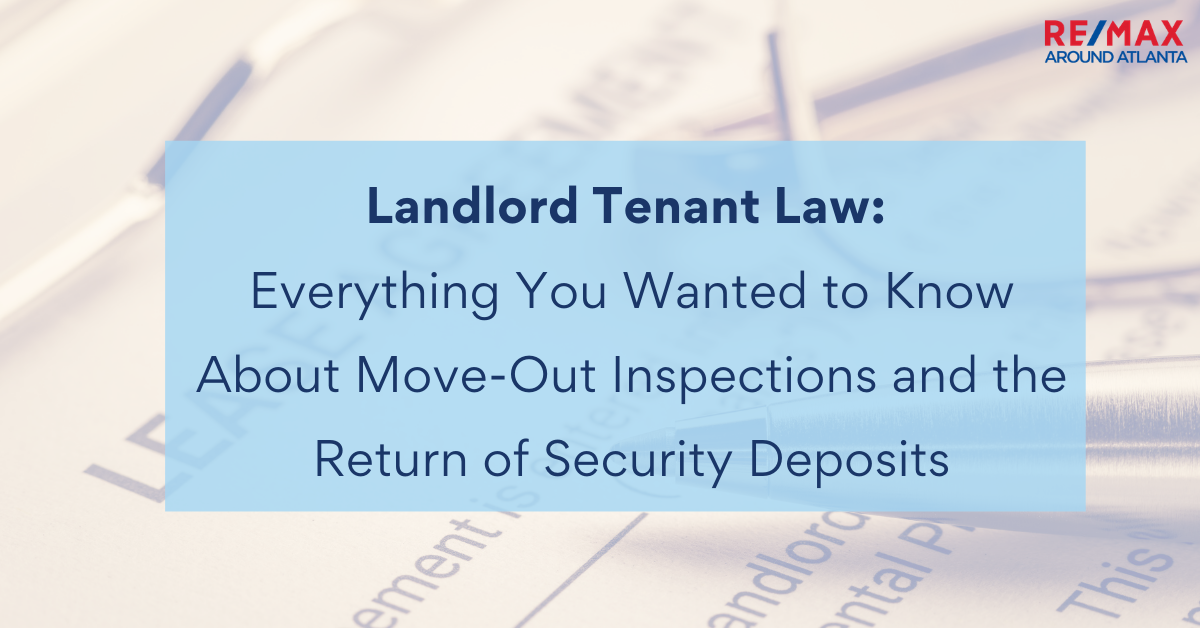|
Landlord Tenant Law: Everything You Wanted to Know About Move-Out Inspections and the Return of Security Deposits Landlords who own more than ten (10) rental units, including units owned by their spouse and/or children, or who employ a management agent, must adhere to a formal inspection process or forfeit the security deposit. Within three (3) business days after the lease terminates, or a reasonable time after the landlord discovers the tenant vacated, the landlord must inspect the unit and prepare a list of all damages and the estimated dollar value of such damage. The landlord must sign the list and provide it to the tenant. O.C.G.A. §44-7-33. The tenant may inspect the premises within five (5) business days after the termination. The tenant must sign the move-out inspection list or specify in writing the items in dispute. It is best for the tenant to be present at the move-out inspection with the landlord. • If the tenant does not dispute or challenge the damages listed on the move-out inspection list, the tenant cannot contest the landlord’s withholding of the security deposit to cover the damage. Therefore, it is very important for a tenant to carefully read through the move-out inspection report. What Can be Deducted From the Security Deposit? The landlord cannot retain the security deposit to cover normal wear and tear that occurs as a result of the tenant using the property for its intended purpose. O.C.G.A. §44-7-34. “Normal wear and tear” refers to the expected slight damages that result over time from ordinary use by the renter and their family or guests. However, the landlord may deduct for:
• Damage caused to the premises by the tenant, members of the tenant’s household, pets, or guests, that is done on purpose, by accident, or due to negligent or careless acts; • Unpaid rent or late charges; • Unpaid pet fees; • Unpaid utilities that were the tenant’s responsibility under the lease; or • Damage to the landlord caused by early termination. Repair or replacement amount? Example: If a tenant damaged ten-year-old carpet to the extent that it can no longer be used, the tenant should be charged for the value of the ten-year-old carpet and not for the cost of the new replacement carpet. Amounts withheld must be reasonable. What if Damages exceed the security deposit? A Landlord can sue the tenant for the cost of damages above the security deposit amount. When Must the Security Deposit Be Returned? All landlords, regardless of the number of units owned, must return the security deposit within one month after termination of the lease or the surrender and acceptance of the premises, whichever occurs last. If the security deposit is held because of damage to the unit, the landlord must send the tenant notice within one month identifying the damage, the estimated dollar amount of the damage, and a refund, if any, of the difference between the security deposit and the amount withheld for damages. What if the landlord does not know the tenant’s new address? The security deposit and any statement of damages must be mailed to the tenant’s last known address even if that is the vacated rental property. If it is returned as undeliverable and the landlord is unable to locate the tenant after a reasonable effort, the security deposit becomes the property of the landlord ninety (90) days after it was mailed. What if the Landlord Wrongfully Withholds the Security Deposit. If the landlord refuses to refund the security deposit, the tenant may bring a lawsuit in the county court where the landlord resides or where his designated agent for service resides to recover the security deposit, interest on the amount while it was wrongfully withheld, attorney fees, and the cost of filing the legal action. The tenant can only recover amounts held by the landlord for damages that the tenant disputed on the move-out inspection list. The court will most likely not allow the tenant to recover for the cost of repairing items listed as damaged on the move-out inspection list and not disputed by the tenant. A landlord who owns more than ten units or uses a management agent can be liable for three times the amount that was withheld plus attorney fees, unless the withholding was a mistake that occurred despite the landlord’s procedures reasonably designed to avoid a mistake. O.C.G.A. §44-7-35. Relevant Law: Georgia Landlord-Tenant Act. Title 44, Chapter 7, of the Official Code of Georgia1 contains laws passed by the Georgia Legislature that affect landlord-tenant relationships in Georgia. Source: Georgia Department of Community Affairs (www.dca.ga.gov). Georgia Landlord-Tenant Handbook
3 Comments
Megan
3/31/2021 12:13:50 pm
You are welcome! Glad you found it useful!
Reply
10/25/2021 07:06:52 pm
I like how you mentioned that the landlord must inspect the unit and estimate the value of such damage. My cousin mentioned to me last night that his friend is having issues with his landlord due to monthly payment and asked if I have any idea what is the best option to do. Thanks to this informative article and I'll be sure to tell him that his friend can consult a trusted landlord-tenant lawyer as they can answer all his inquiries and will help him with what he needs.
Reply
Leave a Reply. |
RMAAReal Estate News, Brokers Blog & More Categories
All
Archives
July 2024
|


 RSS Feed
RSS Feed